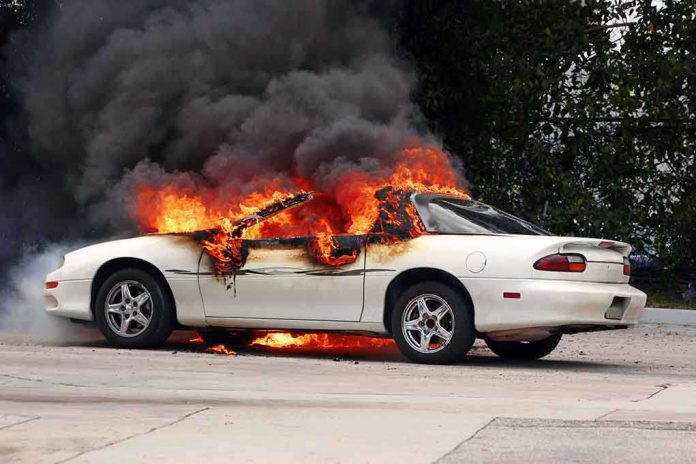
The recall of over 320,000 Jeep plug-in hybrid vehicles highlights the critical safety concerns surrounding EV battery technology.
Story Snapshot
- Chrysler recalls Jeep Wrangler 4xe and Grand Cherokee 4xe due to battery fire risk.
- 320,000 vehicles affected, with a “do not charge” warning issued to owners.
- Batteries manufactured by Samsung SDI America linked to 19 incidents and one injury.
- Owner advisories and recall logistics enforced by NHTSA.
Battery Recall: A Significant Safety Concern
Chrysler’s recall of over 320,000 Jeep plug-in hybrid vehicles has raised alarms about the safety of EV batteries. The Wrangler 4xe and Grand Cherokee 4xe models are affected due to a defect in the battery packs supplied by Samsung SDI America. These defects pose a significant fire risk, prompting an urgent advisory for owners not to charge their vehicles and to park them outside away from structures. This recall is a stark reminder of the challenges facing the burgeoning EV market.
Jeep owners issued urgent ‘do not charge’ warning as 320,000 EVs recalled https://t.co/lqf2bq84Zo pic.twitter.com/eJUks1xsEZ
— The Independent (@Independent) November 5, 2025
The recall was publicly announced on November 4, 2025, and follows 19 reported incidents, including one injury potentially linked to the defective batteries. The scale of the recall, coupled with the explicit instruction not to charge the vehicles, underscores the severity of the risk. With the recall affecting such a large portion of Jeep’s electrified fleet, the repercussions for Chrysler, Jeep owners, and the broader EV sector are substantial.
Historical and Regulatory Context
Jeep, a prominent brand under Stellantis, has been at the forefront of expanding plug-in hybrid options with the Wrangler 4xe launched in 2020 and the Grand Cherokee 4xe in 2022. However, the rise in adoption of plug-in hybrids and electric vehicles has naturally led to increased scrutiny over battery safety. Previous recalls in the automotive industry, involving brands like Chevrolet and Hyundai, have established rigorous regulatory responses to battery fire risks. Despite previous recalls addressing battery-related issues, the current recall reveals either a persistent or newly identified defect, emphasizing the complex challenges of ensuring battery safety.
Jeep owners are urged to remain vigilant and adhere strictly to the advisories issued by Stellantis and the National Highway Traffic Safety Administration (NHTSA). The NHTSA has set protocols for such recalls, including public advisories and Vehicle Identification Number (VIN)-based recall lookups, available from November 6, 2025. Interim notification letters to affected owners are scheduled for mailing by December 2, 2025.
Impact on Stakeholders and Industry Dynamics
Stellantis, the parent company of Chrysler, is now tasked with managing the recall logistics and ensuring customer safety while mitigating the impact on its brand reputation. Samsung SDI America, the supplier of the faulty batteries, is also under scrutiny for their role in the defect. The NHTSA continues to oversee the recall procedure, emphasizing the need for regulatory compliance and public safety.
Jeep owners, who are directly affected by the recall, face significant inconvenience and potential safety risks until a permanent remedy is available. This situation could lead to a loss of consumer trust in Jeep’s electrified models and increased regulatory scrutiny over battery suppliers and automakers. Moreover, the financial and reputational costs for Stellantis and Samsung SDI America could be substantial, potentially leading to legal claims if the situation escalates.
Broader Implications for the EV Market
This recall highlights the ongoing challenges and risks associated with the rapid adoption of electric vehicles, particularly concerning battery safety. While recalls of this nature are disruptive, they are critical for maintaining public trust in EV technology. Safety experts emphasize the importance of robust supplier vetting and rigorous post-market surveillance to prevent such incidents. The effectiveness of regulatory oversight and industry responsiveness is crucial in addressing these challenges.
Analysts warn that repeated battery recalls could slow the momentum of EV adoption unless addressed proactively. The current recall serves as a significant case study for the automotive industry, highlighting the urgent need for comprehensive quality control measures and technological advancements to ensure the safe deployment of electric vehicles.












